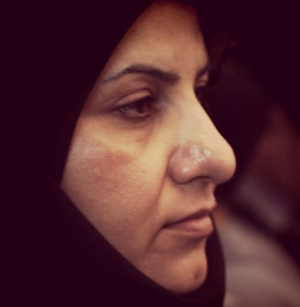 MEDIA ROOTS- The news that King Abdullah would permit women to vote and run in
local elections in 2015 was met with the predictable array of responses
in the corporate media. Very little was said about American-Saudi relations going back more than half a century. Unmentioned were the
anti-egalitarian campaigns that the plutocrats of both societies
colluded on, to squash any dissent and threat to the flow and control of
oil or petrodollars.
MEDIA ROOTS- The news that King Abdullah would permit women to vote and run in
local elections in 2015 was met with the predictable array of responses
in the corporate media. Very little was said about American-Saudi relations going back more than half a century. Unmentioned were the
anti-egalitarian campaigns that the plutocrats of both societies
colluded on, to squash any dissent and threat to the flow and control of
oil or petrodollars.
American policymakers may rehearse and make emphatic speeches in international meetings on human rights or the status of women in other countries, but it’s pretty clear that the policies of succeeding administrations since FDR have created income inequality, political disempowerment, widows, orphans, broken societies, lack of opportunity for education, populations vulnerable to sex trafficking, patriarchy, especially in the majority-Muslim world.
Conservatives like Laura Bush and well-intentioned but counterproductive liberals often exacerbate the situation for women worldwide, and refuse to acknowledge the role that American foreign policy–serving the interests of a global capitalist class–has in perpetuating, amplifying, and worsening disparities and trauma of women.
MR
***
SLATE– King Abdullah announced on Sunday that Saudi women will be allowed to vote and run for office in municipal elections beginning in 2015. Saudi watchers view the move as a weaker step than allowing women to drive, a right women have been demanding publicly for more than two decades. Why did Saudi women find it easier to get the vote than a driver’s license?
Because the right to vote is meaningless. Elections are mostly symbolic in Saudi Arabia. Only half of the seats on the municipal councils are up for election, while the ruling al–Saud family appoints the other half of the members and the mayors. The councils have little power. The government reserves the right to postpone elections, as it did in 2009. There’s no guarantee that the 2015 elections, in which women are supposed to participate, will happen on time, or at all. Moreover, King Abdullah’s announcement doesn’t carry the force of law. He could change his mind at any time. Or, if the 87-year-old king isn’t around in 2015, his successor could easily go back on Abdullah’s promise to Saudi women.
While voting in municipal elections is hardly a move toward true political authority, Saudi conservatives view female driving as the first practical step away from the kingdom’s guardian system, which keeps women reliant on men. As things stand, women in Saudi cities can’t get around unless they can afford a driver or have a male family member who’s willing to chauffeur them. (Young men with many sisters have it tough in the kingdom.) Public buses have separate doors and seating areas for women, but they are slow and unreliable. Some women are afraid to ride in taxis because there have been reports of inappropriate comments by Saudi drivers. (Foreign-born drivers don’t have the same reputation, because the Saudi criminal justice system has treated immigrants brutally.)
Read more about Why is King Abdullah Willing To Let Saudi Women Vote But Not Drive Cars?
© 2011 Slate
Photo by Flickr user Dmunk–huulei










